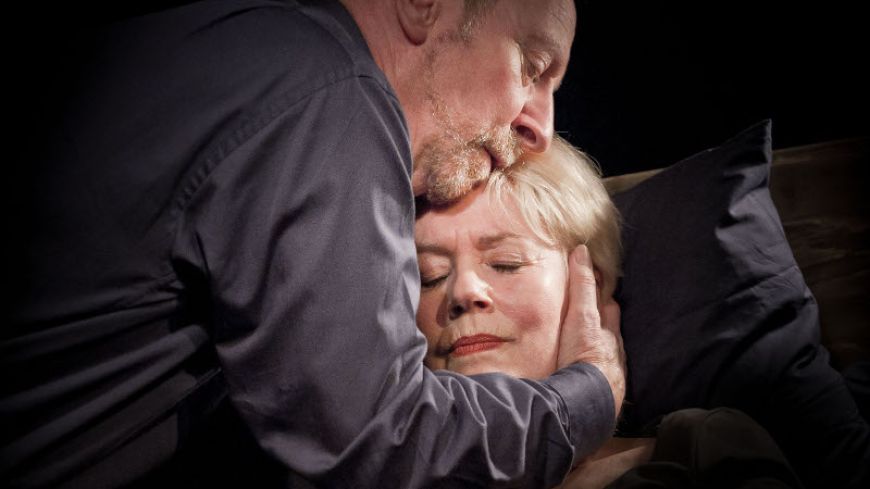
Anyone who has witnessed someone dealing with the sentence of a terminal illness knows the pain of seeing the person’s life being gradually, sometimes quickly, reassessed; shifting to the small place where it will end.
They face the horrific dilemma of not wanting to die but equally not wanting live in the misery and pain that they anticipate.
Tom Holloway’s play deals with the sensitive topic through the snapshot of a long term married couple deal as they with this very issue: the tensions of wanting the best for a loved one by accommodating their wish to die and in doing so of hastening the anguish and solitude that awaits that remaining partner when they do.
Set on a round revolving stage that symbolically holds the couple in their own world of two, we watch dutiful husband Don (Bill Paterson) sit with quiet watchfulness in the dim light of a sick room as his wife Pam (Dearbhla Molloy) calmly sits up in bed with her legs crossed as if she is watching TV for the seemingly endless time it takes for the lethal cocktail to kick in.
Pam is extraordinarily cool and in charge, clearly the dominant partner in the marriage, although she refers to Don throughout as her ‘Prince’.
Their Mars and Venus worlds as well as the dynamics of their relationship are exposed through her light hearted reminiscences of camping holidays with the children in the early days of their long and successful marriage. A slow version of the Turtles’ song Happy Together was the poignant backtrack throughout.
Their recent past is shown as the revolving stage turns to a show a set of G plan table and chairs where Pam announces her indomitable wish to a distraught Don and where the couple have their last supper together.
Throughout the play, Paterson’s body language told of his character’s fear, desolation and despair but not more than during this meal where he already had the demeanour of a lost and lonely man; Pam already gone, already a ghost. Tellingly Pam ate, Don did not. Consequently, and bizarrely, it is Don that evokes the pity as Pam’s clear headedness implies a quiet and determined strength.
The subject of euthanasia is still not far off being taboo so it is a brave thing to put on such an intimate play on the subject. Yet even at the end when the worst of all worlds manifests for this loving couple, I was left strangely unmoved by this slow, sad song to love and life. Still, it was a real pleasure to see Bill Paterson, who brought believability to his role, perform on stage.
30 July – 26 August
Times vary (see Fringe programme)
£6 - £20
Recommended 14+

